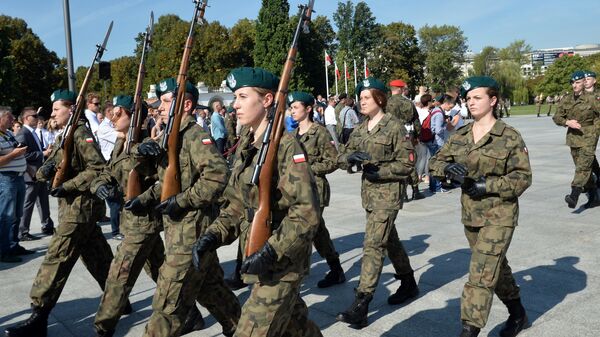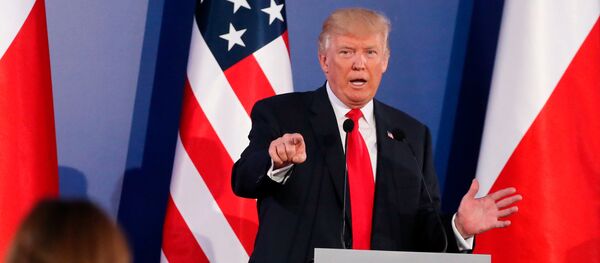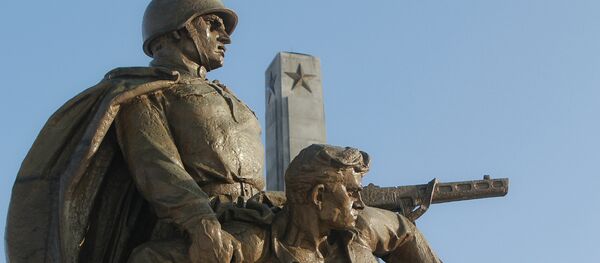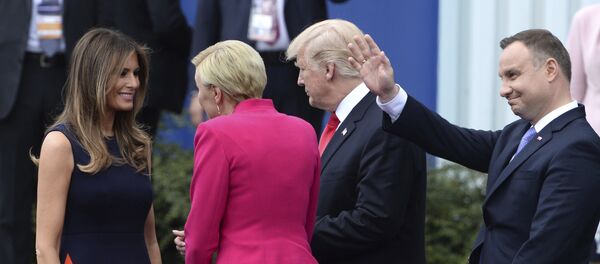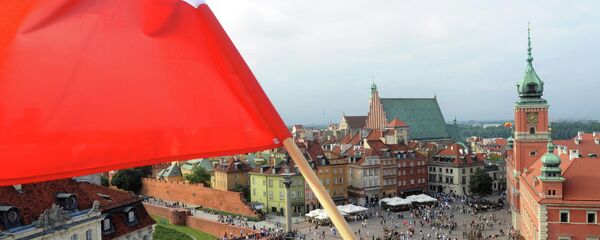It is quite clear why he went to Warsaw ahead of the G20 summit – Poland is the leader of that half of Europe that speaks the same language of "national sovereignty" that Trump does, that Europe that could help him fight the globalist Brussels, Berlin and, probably, Paris (unless Macron suddenly changes his mind).
Donald Trump needs the sympathies of this part of Europe.
However, those sympathies are yet to be conquered: according to a Pew poll, only 23 percent of respondents in Poland support Trump's foreign policy (compared to Obama's 58 percent). Therefore, it is understandable that Trump started by paying compliments to his hosts, praising the Polish nation, its historical achievements and even its geographical position.
Polish people, who are living through a spike of some kind of "Great Poland" nationalism, can be expected to embrace Trump for his statement that "Poland is a heart of Europe," considering Poland's stand-off with Brussels, the other supposed "heart" of Europe to Berlin's "brain."
To the same ends, Trump distorted history in favor of Poland's view of things. Trump described how the Poles stood against the Bolshevik army in 1920 and saved Europe from Soviet conquest (despite the vexing fact that Poland's wish to annex the best pieces of Ukrainian and Belorussian territories actually inflamed conflict). He also said that in 1939, Poland was "attacked again – by Nazi Germany from the West and the Soviet Union from the East," this, despite the fact that Poland initially shared defeated Czechoslovakia with the Third Reich and then reaped what it had sown).
"I cannot rule out that Trump's speech was prepared by someone from his administration of Polish origin. Such good knowledge of Polish historic weak points and such good hits are quite untypical," said Dmitry Ofitserov-Belsky, an associate professor of Moscow High School of Economics.
Among those precise hits was also the Polish version of the Warsaw Uprising.
"In the summer of 1944, the Nazi and Soviet armies were preparing for a terrible and bloody battle right here in Warsaw. Amid that hell on earth, the citizens of Poland rose up to defend their homeland…. More than 150,000 Poles died during that desperate struggle to overthrow oppression. From the other side of the river, the Soviet armed forces stopped and waited. They watched as the Nazis ruthlessly destroyed the city, viciously murdering men, women, and children," Trump said.
Usually, a lie is actually a half-truth. The Soviet and the Nazi army did prepare to fight in Warsaw. These were the circumstances under which the Poles rebelled. But why did they? That happened not because of national pride because in that case they would have stood together with Polish Jews during the heroic defense of the Jewish ghetto in Warsaw in 1943. Polish activists rebelled because the government in exile that was in London at that time wanted to strengthen its positions in the coming negotiations about the future of Poland.
"The initiative and choice of time belonged, of course, to the [Polish] emigration government, with active participation of the British government. They wanted to present the USSR with a fait accompli of the liberated Warsaw, and therefore prevent the transfer of power to a government made of USSR sympathizers. In some ways, this was a reaction to the creation of the Polish Committee of National Liberation in Moscow on June 21, 1944, which would be later transformed into the Provisional Government of the Republic of Poland," Ofitserov-Belskiy says.
According to him, the uprising must have been sparked right after German forces left the city, but before Soviet forces stepped in. But the rebels' mistake: the German forces, on the instructions of Commander of the Army Group Center Walter Model, decided not to leave after all and increased their garrison instead.
As for the Soviet help, yes, just as Trump said, "the Soviet armed forces stopped and waited." They watched, but what else could they do?
"The crossing of Vistula could have been performed only as a part of a wide and well-prepared operation, the kind that Vistula-Oder Offensive of January 1945 was. It was impossible to do that earlier: anyone familiar with military arts would tell you that the earlier Soviet offensive during Operation Bagration was too fast. Belorussian railroads were destroyed by the guerilla fighters during Operation Concert in 1943, and time was needed to pull the reserves and the armaments to the frontline that moved far to the West. The main task of the Soviet command at that time was to avoid the counter-offensive and of course they had no intention of throwing their forces into a pocket [encirclement] on the Vistula's left bank," Ofitserov-Belskiy says.
However, the Soviet command did help.
"In 2014, the Federal Archival Agency of Russia published a bunch of historic documents that show that the help given to the uprising from the Soviet side was both considerable and regular. Sine September 24, the headquarters of the 1st Belorussian Front was in contact with the main directors of the uprising. Cargo drops and artillery fire was coordinated. Soviet pilots performed 4,821 flights towards Warsaw, with 2,435 of them cargo drops, 100 sorties against Hitler's air defense, and 1,361 for bombing and airstrikes against enemy forces – all at the rebels' request. Pilots of 925 flights were tasked with covering districts occupied by the rebels from the air, to perform reconnaissance for them," says Alexander Dyukov, a Russian historian and a director of Historical Memory Foundation.
Moreover, the forces of General Zygmunt Berling (commander of the pro-Soviet Polish First Army [Pierwsza Armia Wojska Polskiego], part of the 1st Belorussian Front) attempted to cross the Vistula in September 1944. More than 3,000 soldiers of that landing party, who wanted to save the lives of Warsaw's citizens, died because of London and the exile government's gamble.
However, Trump does not need historic truth – he needs to make an impression. And it has been made.
"Poland is over the moon now, and people compare Trump's speech to that of Pope John Paul II during his first visit to Poland," Ofitserov-Belskiy says.
Thus, Trump leaves a liar, but a more popular one.
The author is Gevorg Myrzayan, associate professor of political sciences at the Financial University of the government of Russia.

